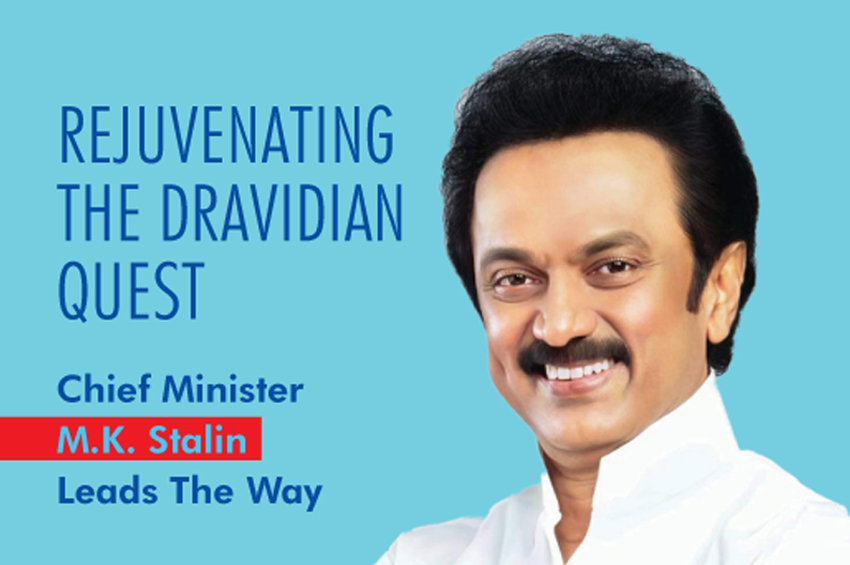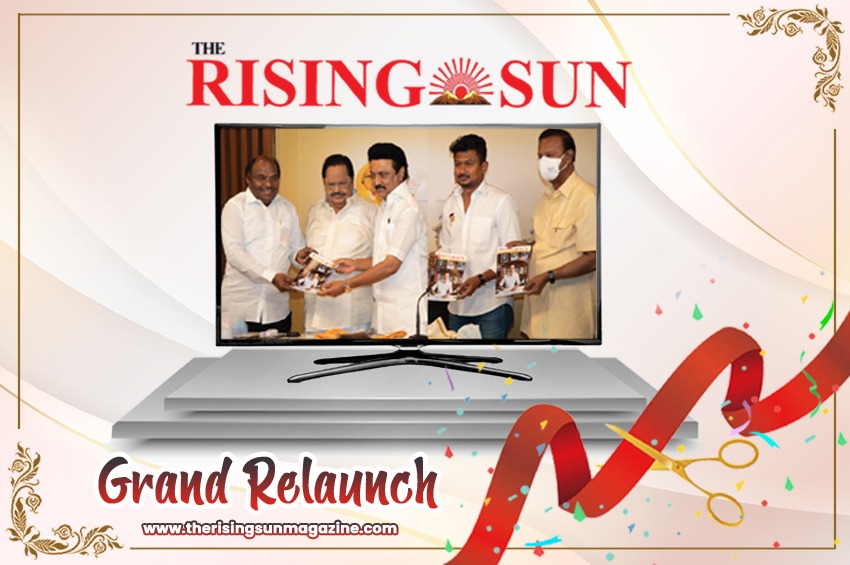Leading the DMK-front to a formidable victory in the April-May, 2021 Assembly elections in Tamil Nadu, Muthuvel Karunanidhi M.K Stalin, after a hard-fought poll battle, was not exactly on cloud nine.
The Dravida Munnetra Kazhagam (DMK) could hardly celebrate its victory with usual mirth when the poll results were declared on May 2, 2021, as the shadows of a second Covid-19 wave had already begun to lengthen.
However, when a 34-member new DMK Ministry led by Mr. M.K. Stalin, son of the former Chief Minister, ‘Kalaignar’ M Karunanidhi, took charge at a simple swearing-in function at the Raj Bhavan on May 7, his resounding tweet that “I belong to the Dravidian stock”, aired the political significance of the change of guard at Fort St. George, the seat of Government in Chennai, loud and clear.
Politics and people’s welfare have blended for the DMK, since its founding days under leaders like Perarignar Anna, ‘Kalaignar’ and ‘Perasiriyar’ K. Anbazhagan, inheriting the Justice Party’s legacy. Stalin’s tweet thus spelt the rejuvenation of what may be called a new phase of the ‘Dravidian Quest’ in a disturbingly new India.
It not only elevated the people’s inherent faith in ‘Secularism’, but their mandate was also for a holistic development of the State in all spheres, in voting the DMK back to power after ten years. Those were also years of political churn in a post-Jayalalithaa and postKarunanidhi scenario.
“I am born anew at this moment,” declared Stalin when he, amid deep grief, assumed office as the DMK President on August 28, 2018, at the party headquarters, ‘Anna Arivalayam’, three weeks after the demise of ‘Kalaignar’ that year. It was a turning point for both the DMK and M.K. Stalin.
It is these larger developments, amid sustained campaigns by the forces of ‘cultural nationalism’ led by the BJP, that lends credence to the perception that the Assembly poll win, capping Mr.M.K Stalin’s strenuous, determined and well-planned election campaign, has galvanized the ‘Dravidian Quest’.
Mr.M.K.Stalin had no time to lose. After paying respects at the memorials of Perarignar Anna and ‘Kalaignar’ on Marina sands, the new Chief Minister drove straight to the Secretariat and signed the first five important files, to implement some of DMK’s key poll promises.
People were hard pressed for cash in the wake of the Covid-induced economic crisis. Acknowledging it, the Chief Minister advanced the payment of the Covid-19 cash relief of Rs. 4,000 to all 2.17 crore rice ration card holders in the State by directing that Rs 2,000 be paid immediately as first instalment. The second instalment was also paid after the birth anniversary of Karunanidhi on June 3 this year.
The price of milk sold by the State cooperative ‘Aavin’ was slashed by Rs. three a litre, and bus travel for women by ordinary fare state transport buses in cities and towns was made free- a huge relief for women working in the informal sector, students and others amid a pandemic crunch-.
Mr.M.K.Stalin also immediately appointed a woman IAS officer, Shilpa Prabhakar Satish, to document and redress all the about 4.58 lakh petitions he had received during his poll campaign under the ‘Chief Minister in Your Constituency’ initiative, a very effective and novel strand to his public reach-out.
He also made Covid-19 treatment in private hospitals come under the ambit of the Chief Minister’s Comprehensive Health Insurance Scheme.
These five pro-people decisions on day one showed that Mr. Stalin was giving positive content to realizing the people’s ‘Dravidian Quest’. It was further manifest in his approach to tackling and containing the pandemic’s second wave, through a consensus model involving all stakeholders.
Stalin’s unruffled defence in the Assembly of the State’s use of the expression ‘Ondriya Arasu (Union Government)’ to refer to the ‘Government of India’ in all official communications as more reflective of the federal spirit of the Constitution, was writing a new chapter in Centre-State relations.
The new Government appointing the Justice A.K. Rajan Committee to study the impact of the National Eligibility-cum-Entrance Test (NEET) on medical admissions, was again in concord with the DMK’s core commitment to more powers to the States and ensuring Social Justice.
If Mr. M.K.Stalin’s directive to the Police not to deploy women constables for VVIP-visitduties struck an empathetic chord as a prowomen measure, his intent to bring resolutions in the Assembly against the three Farm Laws, Citizenship Amendment Act (CAA), a new Bill to jettison NEET and steps for a new Statelevel Education policy, are ample testimony to DMK renewing the ‘Dravidian Quest’.
The Chief Minister has instituted the ‘Ilakkiya Mamani Virudhu’ to honour three Tamil writers every year whose works contributed to enriching Tamil language, literature and culture, with a purse of Rs. Five lakh each and a citation. A ‘Thagaisar Tamizhar Virudhu’ to honour a Tamil society icon annually, adds to the flavour of remembering roots.
The Government has also announced building a Rs. 70 crore grand library in Madurai in memory of the late Chief Minister ‘Kalaignar’ M. Karunanidhi, which will be a boon to youth of the rural South.
The free bus travel was later extended by Mr. Stalin to ‘Transgenders’ and differentlyabled persons on June 3, even as a new department for the ‘Tamil Diaspora’ is in the offing. Such initiatives help to strengthen the ‘Dravidian ethos’ which the new DMK rule wants to re-vitalize, while maintaining good administrative relations with the Union Government.
DRAVIDIAN MODEL OF INCLUSIVE GROWTH
In a unique development, Mr. Stalin stunned one and all when his decision to constitute a high-level ‘CM’s Economic Advisory Council’ comprising international experts, was announced in Governor Banwarilal Purohit’s first address to the new Assembly. It hit page one even in media abroad.
The Council includes former Reserve Bank of India (RBI) Governor, Dr. Raghuram Rajan, Nobel laureate in Economics Ms. Esther Duflo, former Chief Economic Advisor to the Government of India, Dr. Arvind Subramanyam, Development Economist Dr. Jean Dreaze, and Mr. S. Narayan, former Finance Secretary and former economic advisor to late Prime Minister A.B. Vajpayee
In his first interaction with them through video conference on July 9, M.K Stalin explained the ‘Dravidian Model’ of inclusive growth in Tamil Nadu as he sought the experts’ advice on ways to improve the growth rate without sacrificing equity, intraregional balance, and access to high quality education and health for all. The Government ‘is ready for radical changes’, he further told them.
INDUSTRIAL VISION
At an ‘Investors Conclave’ organised by the State Industries Department in Chennai on July 20, he launched the new ‘Single Window Portal 2.0’, with 100-plus services spread across 24 departments for facilitating quick approvals and attracting more investments in a fully digitalised eco-system. The Industries and Tamil Culture Minister, Mr. Thangam Thennarasu, was also present on that occasion.
“We want Tamil Nadu to be one of the best investment destinations in South Asia; our government’s target is to make Tamil Nadu a One Trillion (about Rs One Lakh crore) GDP economy by 2030,” said Mr.M.K Stalin, speaking on that occasion. “We also want to ensure that there is a conducive business environment in the State,” he added.
While global industrial players, particularly automobiles and electronics, from Hyundai Motors, Daimler, Caterpillar, RenaultNissan, Samsung, Toshiba to Michelin Tyres, have already invested in Tamil Nadu when Mr. M.K Stalin was the Deputy Chief Minister in an earlier term (2006-11), in the recent conclave, MoUs’ for 49 projects were inked with a total investment commitment of Rs 28,508 Crore, with potential to create 55,054 jobs.
The masterstroke in the revised budget for 2021-22, presented by Finance Minister, Palanivel Thiaga Rajan, to cut petrol prices in the state by Rs. three a litre, both as a big relief to the middle and working classes and as an ‘economic stimulus’, came as another fulfilling moment, alongside the first Agriculture budget, in the first 100 days of the M.K. Stalin-led government.




